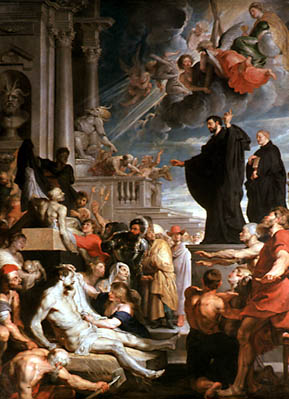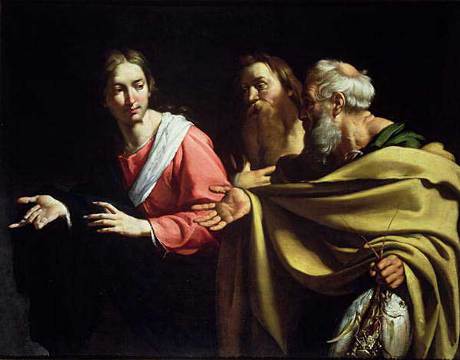 Determining Personal Gifts In order to lead a happy life it is very important, it seems to me, to be true to your personal vocation. I have written before, here, about the advice that I was given over 20 years ago, which opened up the way for me to a wonderful life.
The guidance I was given focused strongly on what to do: what is picture of perfect happiness that I envisage for myself? What job, life situation and so on does God intend for me? Having set out this vision, by ordering my activities so that gradually I move towards it, I found that I developed the skills and discovered that I had the gifts necessary to make it happen.
Determining Personal Gifts In order to lead a happy life it is very important, it seems to me, to be true to your personal vocation. I have written before, here, about the advice that I was given over 20 years ago, which opened up the way for me to a wonderful life.
The guidance I was given focused strongly on what to do: what is picture of perfect happiness that I envisage for myself? What job, life situation and so on does God intend for me? Having set out this vision, by ordering my activities so that gradually I move towards it, I found that I developed the skills and discovered that I had the gifts necessary to make it happen.
There is another way of discerning personal vocation that I have discovered recently. This came through my contact with Fr Michael Sweeney, the head of the Dominican School of Philosophy and Theology in Berkeley, California, when I attended a course there that discussed the idea of personal vocation contributing to the overall mission of the Church, the common good.
His focus is on discerning our gifts and special skills, and works on the assumption that if we then seek to employ these in our lives, bit by bit we will be guided towards the appropriate theatre in which to apply them. Each of us has a calling that is our personal contribution to the common good. Every person therefore is given a unique set of gifts by the Holy Spirit – charisms he called them – that will enable us to fulfill that vocation and so lead of life Christian joy. When we exercise those gifts we do so with a special authority as assigned to our unique position with the Church, in my case it is the Lay Office. These gifts can be things we often associate with the lives of the saints – for example the gift of leading a life of poverty for the greater glory of God. Or they can be very practical things: art, music, writing or teaching. They can also be special skills that those of us who don’t have them find it difficult to imagine anyone feeling fulfilled doing, such as the charism of administration. In connection with this, one of the things that struck me about St Ignatius of Loyola is that after he created the Jesuit order he spent most of his time quietly in Rome administering the growth of his organization. Other Jesuits, such as St Francis Xavier, were the great missionaries of the organization.
 When I became a Catholic one of the things that attracted me to the Faith was the belief that this offered the way to greatest happiness. My friend David who was instrumental in bringing me into the Church always stressed how certain he was that God wanted me to be happy. When I got into the Church I realized, judging from the way they talk about their lives and their faith that not all faithful Catholics are aware of this. I have never subscribed to a view that life is something that we put up with while we await eternal bliss in heaven. Rather, eternal life starts here and now and by degrees we can experience that heavenly form of existence in this life (though not fully until we die).
When I became a Catholic one of the things that attracted me to the Faith was the belief that this offered the way to greatest happiness. My friend David who was instrumental in bringing me into the Church always stressed how certain he was that God wanted me to be happy. When I got into the Church I realized, judging from the way they talk about their lives and their faith that not all faithful Catholics are aware of this. I have never subscribed to a view that life is something that we put up with while we await eternal bliss in heaven. Rather, eternal life starts here and now and by degrees we can experience that heavenly form of existence in this life (though not fully until we die).
Intrigued by what I heard from Fr Sweeney I decided to go investigate further. Before he moved to Berkeley, Fr Sweeney was working as head of the organization that he founded to enable people to discern these gifts, the Catherine of Siena Institute. I ordered from the Institute their Called and Gifted series of recorded talks. In these Fr Michael and the co-founder Sherri Weddell describe how we can determine these gifts. I recommend them.
As described in the recorded talks, the characteristic of a charism is that it gives you special abilities that achieve great observable results, that are for the good of others and exercising these gifts feels easy and natural (although it may seem extraordinary to others who see the results). Most importantly, when exercising these charisms, we feel fulfilled. The Catherine of Siena process of discerning charisms (and you can have more than one) involves a guided examination of one’s past experience for signs of the workings of a charism. These gifts can be in very practical things, such as art, music or craftsmanship. They can be in more intellectual pursuits such as teaching or learning. They can also be in what we would probably more commonly associated with the word ‘charismatic’ in the context of the Church, such as a gift of evangelization.
I should declare hear that I have never been attracted to what I have seen of what is commonly referred to as charismatic Christianity, Catholic or otherwise. It always seems to me that there is too much emphasis on emotion and not enough on reason. What appeals to me in this approach to discerning them is that it is systematic and rational. There is no arm waving (with or without tambourine) or hysteria.
As a result of this process, it has not changed the my life direction particularly. I was not expecting this as I already feel that I am doing what want to do. However, it has changed my sense of how I should aim to achieve what I want to do. It has been revealing and helpful to me.
Also, it has immediately made more conscious of differing individual strengths and weaknesses. I can see now why I find some things very easy that others find difficult and so I can see that I ought to be more understanding when dealing with them. Similarly, it has made me less frustrated at myself in other respects. It has been obvious to me that there are things that seem to come naturally to so many people. It increases my awareness, I feel, that we all need each other to cooperate in working towards the common good.
I close with a quote from St Cyril of Jerusalem. What he says applies to all charisms, not just those he mentions specifically. It comes from the Office of Readings Monday Week 7 Eastertide, a few days before Pentecost:
“Although the Spirit never changes, the effects of his action, by the will of God and in the name of Christ, are both many and marvellous. The Spirit makes one man a teacher of divine truth, inspires another to prophesy, gives another the power of casting out devils, enables another to interpret holy Scripture. The Spirit strengthens one man’s self-control, shows another how to help the poor, teaches another to fast and lead a life of asceticism, makes another oblivious to the needs of the body, trains another for martyrdom. His action is different in different people, but the Spirit himself is always the same. In each person, Scripture says,the Spirit reveals his presence in a particular way for the common good.
"The Spirit comes gently and makes himself known by his fragrance. He is not felt as a burden, for he is light, very light. Rays of light and knowledge stream before him as he approaches. The Spirit comes with the tenderness of a true friend and protector to save, to heal, to teach, to counsel, to strengthen, to console. The Spirit comes to enlighten the mind first of the one who receives him, and then, through him, the minds of others as well.”
Art work: first, third and fourth are all the Calling of Ss Peter and Andrew by Duccio, Pietro Da Cortona (C17th) and Bernardo Strozzi (C16th) respectively. The second is The Miracles of St Francis Xavier by Rubens (C17th).



